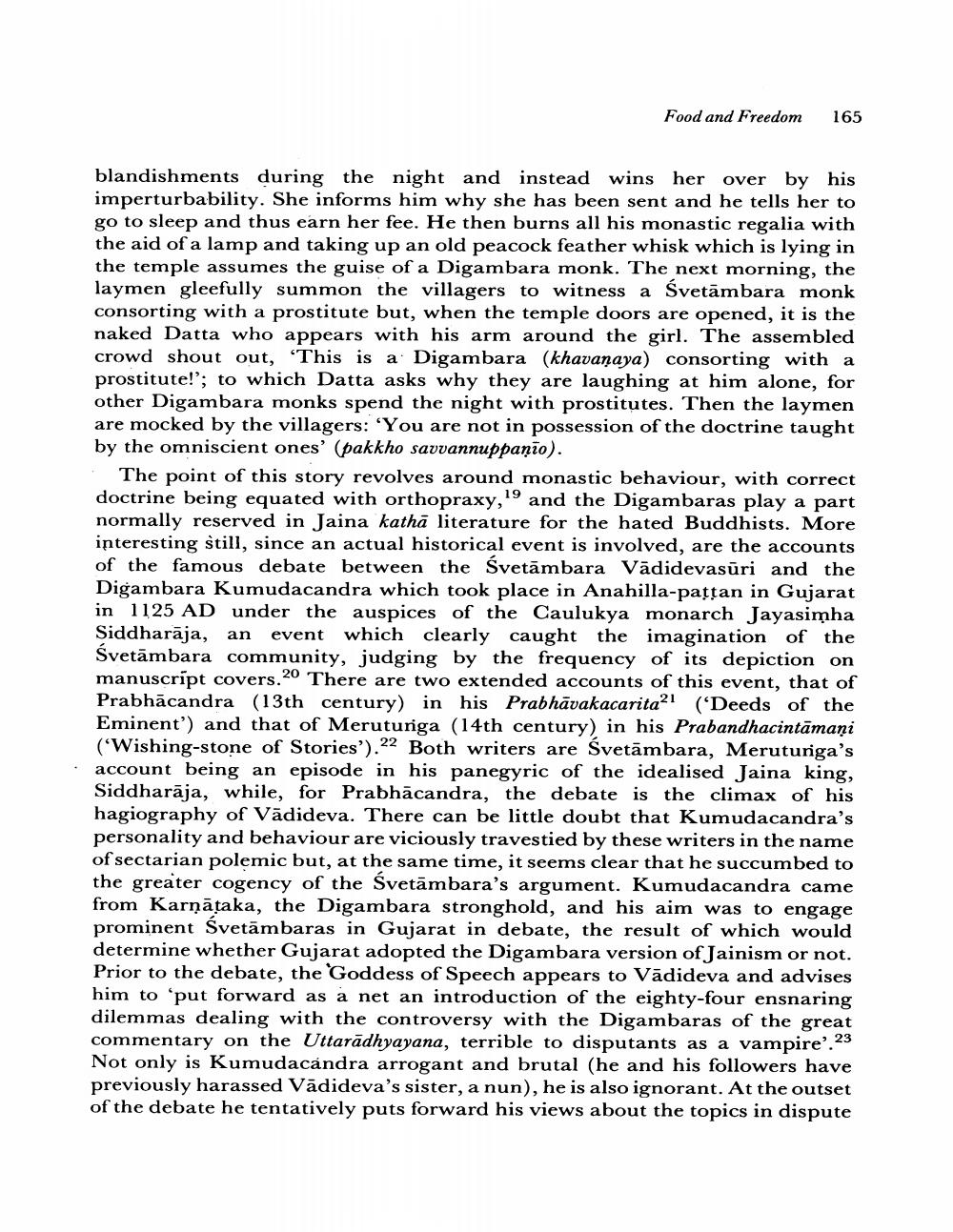Book Title: Food And Freedom Author(s): Paul Dundas Publisher: Paul Dundas View full book textPage 5
________________ Food and Freedom 165 blandishments during the night and instead wins her over by his imperturbability. She informs him why she has been sent and he tells her to go to sleep and thus earn her fee. He then burns all his monastic regalia with the aid of a lamp and taking up an old peacock feather whisk which is lying in the temple assumes the guise of a Digambara monk. The next morning, the laymen gleefully summon the villagers to witness a Svetāmbara monk consorting with a prostitute but, when the temple doors are opened, it is the naked Datta who appears with his arm around the girl. The assembled crowd shout out, 'This is a Digambara (khavanaya) consorting with a prostitute!'; to which Datta asks why they are laughing at him alone, for other Digambara monks spend the night with prostitutes. Then the laymen are mocked by the villagers: 'You are not in possession of the doctrine taught by the omniscient ones' (pakkho savvannuppanio). The point of this story revolves around monastic behaviour, with correct doctrine being equated with orthopraxy, 19 and the Digambaras play a part normally reserved in Jaina kathā literature for the hated Buddhists. More interesting still, since an actual historical event is involved, are the accounts of the famous debate between the Svetāmbara Vādidevasūri and the Digambara Kumudacandra which took place in Anahilla-pattan in Gujarat in 1125 AD under the auspices of the Caulukya monarch Jayasimha Siddharāja, an event which clearly caught the imagination of the Svetāmbara community, judging by the frequency of its depiction on manuscript covers.20 There are two extended accounts of this event, that of Prabhācandra (13th century) in his Prabhāvakacarita21 ('Deeds of the Eminent') and that of Meruturiga (14th century) in his Prabandhacintāmani ('Wishing-stone of Stories').22 Both writers are Svetāmbara, Meruturiga's account being an episode in his panegyric of the idealised Jaina king, Siddharāja, while, for Prabhācandra, the debate is the climax of his hagiography of Vadideva. There can be little doubt that Kumudacandra's personality and behaviour are viciously travestied by these writers in the name of sectarian polemic but, at the same time, it seems clear that he succumbed to the greater cogency of the Svetāmbara's argument. Kumudacandra came from Karnātaka, the Digambara stronghold, and his aim was to engage prominent Svetāmbaras in Gujarat in debate, the result of which would determine whether Gujarat adopted the Digambara version of Jainism or not. Prior to the debate, the Goddess of Speech appears to Vādideva and advises him to 'put forward as a net an introduction of the eighty-four ensnaring dilemmas dealing with the controversy with the Digambaras of the great commentary on the Uttarādhyayana, terrible to disputants as a vampire'. 23 Not only is Kumudacandra arrogant and brutal (he and his followers have previously harassed Vadideva's sister, a nun), he is also ignorant. At the outset of the debate he tentatively puts forward his views about the topics in disputePage Navigation
1 ... 3 4 5 6 7 8 9 10 11 12 13 14 15 16 17 18 19 20 21 22 23 24 25 26 27 28 29 30 31 32 33 34 35 36 37
